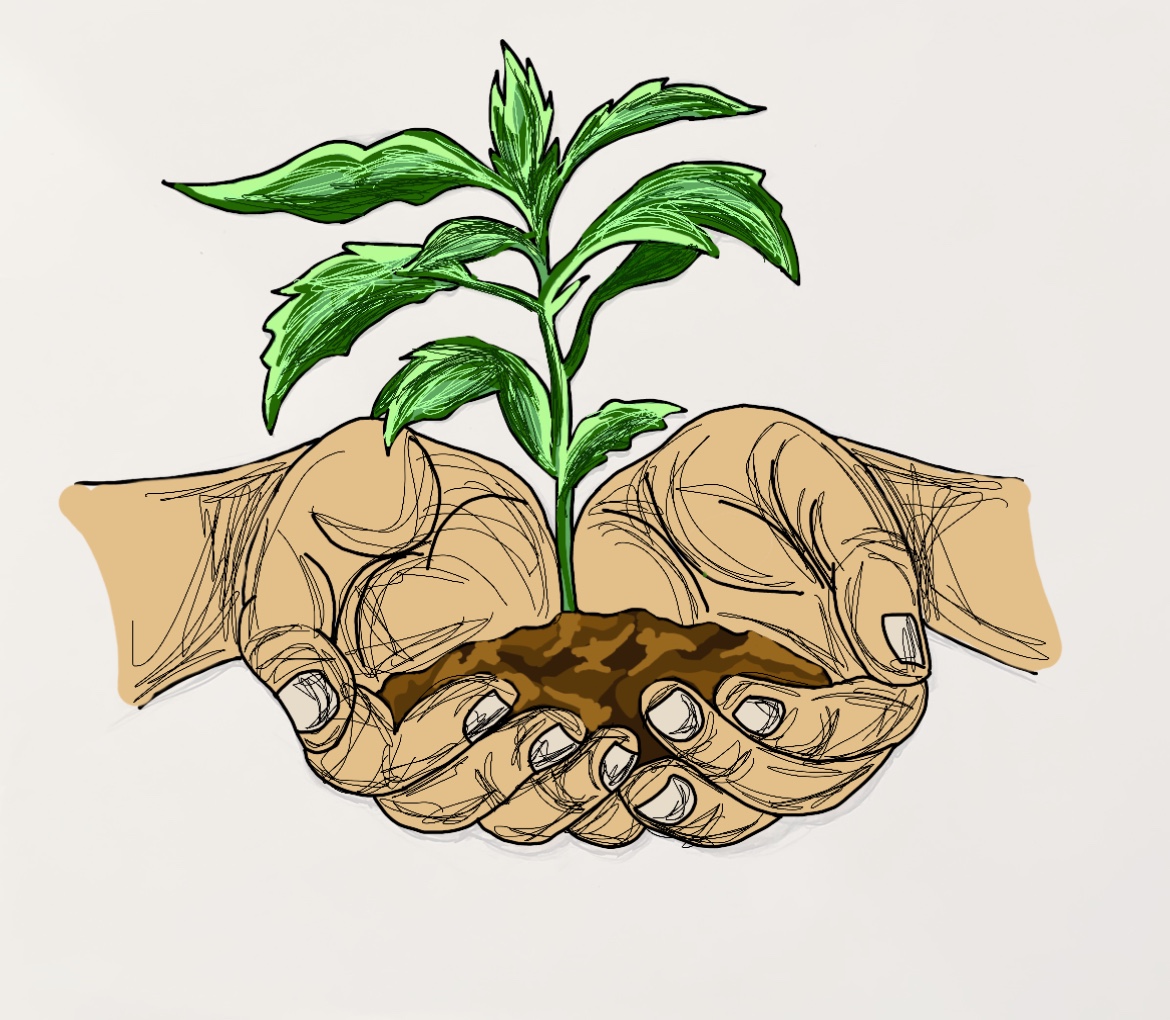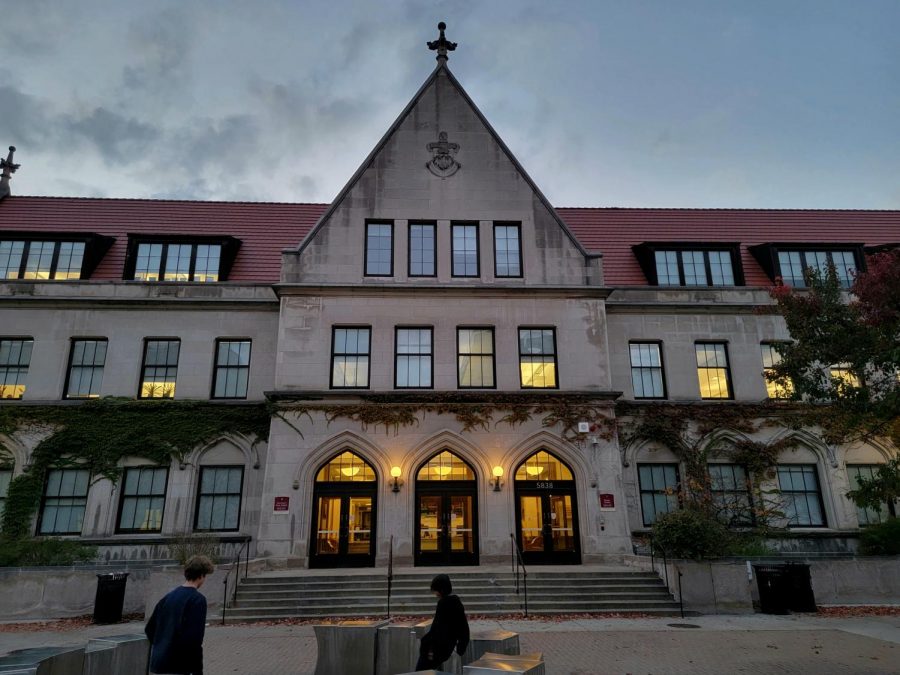Doing our part: the Lab community’s role in the climate crisis
November 12, 2021
From record-breaking storms to record-breaking temperatures, the effects of climate change, once a future promise, are being felt around the world. Students, the Laboratory Schools and the University of Chicago are taking pragmatic steps to lower emissions and create a more sustainable future. That leaves the decades-old question — is it enough to tame our warming climate?
Green initiatives to help reduce Lab emissions
TURNING OFF THE LIGHTS. The Laboratory Schools’ lights stay on from 5:30 a.m. to 1:30 a.m. the next day, according to Lab’s director of operations Joe Wachowski. This is to accomodate faculty access hours and allow custodial workers to finish cleaning.
Imagine the yearly greenhouse gas emissions of 585 average American households, enough for a small town. These emissions total 4,390 metric tons — equivalent to the annual greenhouse gas emissions for the Laboratory Schools historic campus, according to the most recent data from the City of Chicago.
Although Lab has several initiatives to reduce emissions, and incorporates environmental thinking into decision making, the school lacks a long-term strategic vision for emission reduction.
One unique challenge, according to Joe Wachowski, Lab’s director of operations, is reducing the electricity used for lights, which composes a significant part of overall emissions.
“A lot of lights at school are on from 5:30 a.m. to 1 a.m. the next day,” Mr. Wachowski said. “The problem is that there’s always something going on after school. That means custodial staff have to stay to clean up, and they need the lights on.”
Even though Earl Shapiro Hall, opened in 2014, and Gordon Parks Arts Hall, opened in 2015, are Lab’s newest buildings, they also use the most electricity because they have more lights, according to Mr. Wachowski, and the lights are an older luminescent style. When the buildings were designed and constructed, LED lights, which are estimated to produce half the emissions of the luminescent ones used, were too expensive for mass use. As the bulbs are more widely produced their prices decrease, the University of Chicago now estimates it can save 5% in total energy costs by replacing all campus luminescent bulbs with LEDs.
UChicago contractors recently completed a lighting audit of Sunny Gymnasium, a first step to replace the luminescent bulbs with LEDs. The initiative to replace all old bulbs with efficient LEDs is part of UChicago’s sustainability plan to cut emissions by half by 2030.
Although institutional action to curb climate change is of paramount importance, Tony Del Campo, a middle school Earth sciences teacher, believes individuals can still have a powerful effect. He recommends students think critically about how their routine actions contribute to climate change.
“If you’re driving, then you should think about the gasses that you’re putting in the atmosphere, and decide whether it’s worth it. If you’re thinking of buying something new, ask yourself if you really need it,” Mr. Del Campo said. “Refusal is one of the most powerful tools at reducing emissions.”
Brian Hewlett, executive director of finance and operations, believes this framework of incorporating critical environmental thinking to routine tasks also works at a school level.
“We try to think of environmental impact in our day-to-day decisions, whether it’s about reusing an old cabinet, or setting up a sustainable storm water drainage system for Jackman Field,” Mr. Hewlett said, adding that sustainability is always an important factor.
One example of day-to-day environmental impact is Café Lab contractor Quest Food Management’s EarthAware program, which works to minimize Lab’s carbon footprint by purchasing from local vendors and farmers. All leftover food is also composted daily in partnership with Healthy Soil Compost, a West Side waste management service.
Mr. Del Campo is pleased by the initiatives but hopes the school does more to come up with a long-term strategic vision for reducing emissions. He wants the school to write a climate change statement alongside the mission and diversity statements.
“A mission statement would signal Lab’s commitment to addressing climate change, and I think it would help justify certain things to students, like having a no-meat day at the cafeteria,” Mr. Del Campo said, referencing the mammoth greenhouse gas footprint of the meat industry.
He said steps like the statement and hiring a director of sustainability would help with accountability.
Mr. Wachowski acknowledged that he can’t think of a long-term set of goals in place to cut emissions at Lab, nor an administrator who works on improving sustainability.
“The way sustainability works at Lab is more volunteer-based. Some years there’s a lot of excitement from faculty and students and a lot of cool efforts happen, and other years there’s a lot less,” Mr. Wachowski said. “Otherwise, our goals come from UChicago’s sustainability plan.”
Regardless, both Mr. Del Campo and Mr. Wachowski believe that a more sustainable Lab will take the combined efforts of individuals as well as support from the university.
“I’m very hopeful about the future of the school and the world when it comes to climate change,” Mr. Del Campo said. “Even 10 years ago, a lot of the questions I got from students would be skeptical about whether climate change exists. Now, students know it does and are looking for solutions. Young people are demanding a more sustainable future from the people around them and their political leaders.”
Students adapt daily routines toward sustainability
When it comes to reducing individual carbon footprints, it’s the little things that count. And sometimes, those things can be so little, so integrated into daily life, that they go nearly unnoticed.
U-High students, whether they recognize it or not, are already incorporating environmentally-friendly behaviors into their daily lives.
While secondhand shopping is a sustainable and affordable alternative to fast fashion, students like sophomore Marlena Leuz are drawn to it mainly because of low prices and unique finds.
“Secondhand shopping has, like, a excitement to it that firsthand shopping doesn’t because you don’t know what to expect,” Marlena said. “You don’t know what you’re going to buy, but usually end up finding some really cool, like, unique things.”
For her English project on environmentalism last year, senior Ashley Hannah gave up eating meat for a month. She abstained for ethical reasons, not wanting to support the meat industry’s sizable contributions to global carbon emissions. Her project stuck with her, and a year later Ashley is still vegan.
“I was kind of just thinking about the biggest factors of what impacts the environment and what I can personally change right then to make enough of an impact,” Ashley said. “Continuing it has made an impact.”
Ashley originally allowed herself a day per week for any slip-ups but found that dropping meat from her diet was easier than she had expected. Now, veganism has become a part of Ashley’s life and the lives of those around her.
“If you change your diet, and you impact other people, like you talk to other people about that, and they change their diet, that’s what’s making an impact,” Ashley said.
Like Ashley, sophomore Amy Ji described her practice of reducing waste using reusable food containers as a natural part of her daily routine.
“I just know, we have like, a whole cabinet full of these containers,” Amy said. “It’s just like an automatic thing for us. Like we just grab and go and put our food in it.”
Day by day, students do their part to reduce their environmental footprints. Whether a vegan diet, thrifting or reusable containers: though these aren’t on the scale of countries and corporations, these little things do still count.
Performative activism can sometimes be helpful
On Oct. 29 at 3:00 p.m., the YouTube trending page was flooded by content creators releasing videos marked with the #TeamSeas. This torrent of content coming from hundreds of popular creators was part of a charity initiative aiming to remove 30 million pounds of trash from our oceans; one dollar donated to the project corresponds to one one pound of trash removed from the ocean. Within an hour of the videos being released, over $1 million had been donated.
While this incredible effort was well received, it is an example of the often-criticized phenomenon of performative personal activism. The people donating a few dollars to #TeamSeas and posting screenshots aren’t being socially condemned, but other more egregious displays of “environmental wokeness” are criticized and mocked as counterproductive hollow exhibits of activism. However, the practice of personal environmentalist theater should be appreciated as individuals’ best tool in the fight against climate change.
Many people find performative activism indulgent, naïve and counterproductive. Performative environmentalism often seems like insubstantial annoying “virtue signaling.” Popular memes mock people who loudly brag about their metal straws and constantly mention their reusable grocery bags. Individuals’ annoying displays are also trivial, because corporations rather than individuals contribute to the bulk of harmful pollution; just 100 corporations are responsible for 71% of all greenhouse gas emissions from 1988 to 2017. Given this context, one person’s decision not to use a plastic straw or drive a diesel car makes a minimal impact. Besides being mostly ineffective, performative environmentalism hinders progress by directing focus away from the companies and governments that can make impactful change.
However, trivial personal environmentalism is an excellent to for influencing corporate behavior. As personal environmentalism grows more popular and more common, consumer and voter behavior favors companies and candidates that address climate change.
According to interviews in Forbes magazine, leaders from major corporations such as IBM, Ford and General Motors are moving to prioritize sustainability because of how environmental concerns are affecting consumer behavior. These companies are responding through eco-friendly initiatives. This year IBM committed to reaching net-zero greenhouse gas emissions by 2030, and Ford announced that it plans to invest $29 billion into electric vehicles through 2025.
Elections are also influenced by cultural focus on climate issues. During the last presidential election, the candidate debates included questions about climate change for the first time in over a decade, responding to the 52% of Americans that now list climate change as a top priority for congressional and presidential elections. Politicians who can enact meaningful regulation on corporate pollution and other detrimental practices are beholden to these voters, and many are taking steps to respond.
Finally, personal activism is necessary for a healthy mental wellbeing. Growing climate concerns are directly linked to mental health issues, especially in young people. Small actions posted online let individuals feel powerful in the face of such a massive unapproachable issue. Small actions posted online make us feel less powerless in the face of such a massive unapproachable issue. Viewing climate change as an issue that can only be remedied by faceless corporations or unseen political negotiations fuels an unproductive narrative that there is nothing we can do.
So go perform. Donate to #TeamSeas, bring tote bags to grocery stores, bike to school, buy from eco-friendly companies and go vegetarian if you can. When you see people making a big show about their metal straws or posting about how they thrift their clothing to fight fast fashion, try not to be annoyed. Congratulate them.
Solutions and UChicago’s impact by the numbers



